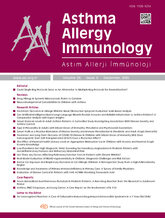


Asthma is an impactful condition resulting in morbidity and incurring significant annual healthcare costs. Exposure to PM2.5 can induce the overexpression of genes encoding transcription factors and cytokines, leading to inflammatory responses and tissue damage. PM2.5 stimulates the release of IL-17A as a driver of severe asthma pathophysiology, where Interleukin-17A and IL-17F can strengthen signaling pathways that are upregulated in the airways of asthma, and their associated cytokines mediate tumor development preventing anti-tumor immunity and by stimulating angiogenesis.
This study presents a case involving a 68-year-old female with worsening shortness of breath over the last week intermittently. The patient also reported weight loss over the past 2 years. The patient was diagnosed with right lung cancer, Small Cell Lung Carcinoma extensive disease (Recist: stable disease) PS 1 VAS 3, and was overweight on the fourth cycle of etoposide-carboplatin chemotherapy. Laboratory examination results showed normal leukocyte count at 5970 μl (neutrophils: 75%, lymphocytes: 13.5%, eosinophils: 1.0%). IL 17A level was 30.429 pg/ml. The highest PM2.5 level reached 28.4 μg/m3.
We establish for our patient a working diagnosis of Small Cell Lung Carcinoma extensive disease with a previous history of asthma. The interaction of PM2.5 with asthma and genetic factors can induce respiratory tract inflammation involving various inflammatory cells and cytokines. Th17 cells and their related cytokines (such as IL-17A, IL-17F, IL-21, IL-22) can strengthen signaling pathways upregulated in the airways of asthma patients and mediate tumor development by preventing anti-tumor immunity and stimulating angiogenesis resulting in the emergence of lung cancer.
The interaction between PM2.5, asthma, and genetic factors can trigger inflammation in the respiratory tract through the activation of IL-17A along with their related signaling pathways, which may mediate the development of lung cancer.